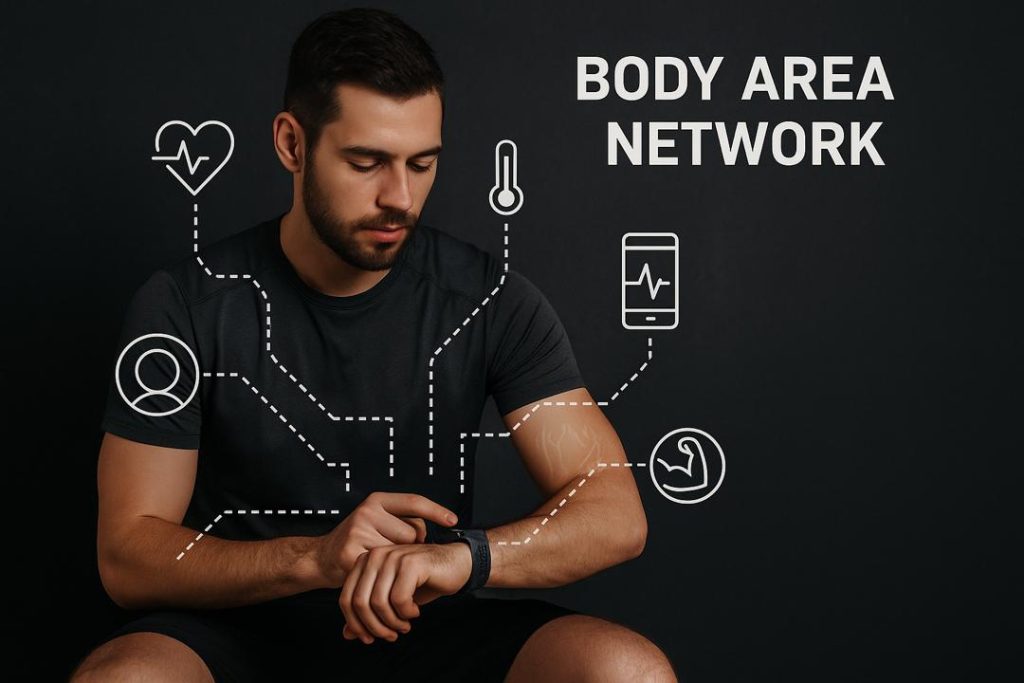
Learn More About Body Area Network
A Body Area Network (BAN), also known as a Body Sensor Network (BSN), is a system of wearable computing devices or sensors that are placed in, on, or around the human body to monitor and transmit physiological data. These networks are designed to collect health-related information such as heart rate, blood pressure, temperature, glucose levels, and even movement or posture. BANs use wireless communication to connect these sensors to each other and to external devices, such as smartphones, computers, or cloud servers, enabling real-time data monitoring and analysis.
BANs play a significant role in modern healthcare and fitness by allowing continuous, non-invasive health tracking. For example, a BAN can help manage chronic diseases like diabetes or heart conditions by sending alerts when readings go outside normal ranges. They are also widely used in sports and fitness for performance tracking and injury prevention. Typically, these networks rely on technologies such as Bluetooth Low Energy (BLE), Zigbee, or even near-field communication (NFC) to transmit data efficiently while preserving battery life.
Security and privacy are critical in BANs due to the sensitive nature of the data being collected. Data encryption, secure authentication, and reliable data transmission protocols are essential features of a well-designed BAN system. As wearable technology and the Internet of Things (IoT) continue to evolve, Body Area Networks are expected to become even more advanced, playing a central role in personalized healthcare, remote patient monitoring, and proactive wellness management.

Learn Web Development In the easiest way
Learning web development has never been easier, and with the right mindset and tools, anyone can get started—even without a technical background. At its core, web development is about building websites and applications, and it involves both the frontend—what users see using HTML, CSS, and JavaScript—and the backend, which runs behind the scenes using languages like Python, PHP, or Node.js. The best way to begin is by learning the basics of HTML for structure, CSS for styling, and JavaScript for interactivity. These are the foundation of everything you see online. There are plenty of beginner-friendly resources available for free, including platforms like freeCodeCamp, W3Schools, and MDN Web Docs, which offer structured tutorials and hands-on practice. One of the easiest and most effective ways to learn is by doing—start with small, real-world projects like a personal website, a blog layout, or a simple to-do list app. These hands-on experiences help solidify your understanding and build confidence. You don’t need fancy tools either—simple code editors like Visual Studio Code or browser-based environments like CodePen and Replit make it easy to practice anywhere. As you grow, you can explore version control with Git and GitHub, build responsive layouts that work on phones and tablets, and dive into backend technologies to make dynamic websites. Web development is a journey, not a race, so be patient with yourself. Stay consistent, stay curious, and enjoy the process. With time and practice, you’ll be surprised at how far you can go—and before you know it, you’ll be building websites entirely from scratch.

Smart Study Tips for Better Learning
Success in studying doesn’t come from long hours alone—it comes from studying effectively. Whether you’re a student preparing for exams or someone picking up a new skill, the right strategies can make all the difference. Here are some practical study tips to help you learn more efficiently and stay motivated.
1. Set Clear Goals
Before you begin, know exactly what you want to achieve in each study session. Break down your syllabus or learning material into smaller, manageable tasks. Clear goals not only guide your focus but also give you a sense of accomplishment as you complete them.
2. Create a Dedicated Study Environment
Having a consistent, clutter-free space to study helps train your brain to focus. Make sure it’s quiet, well-lit, and free from distractions like your phone or TV. A good setup can boost both concentration and comfort.
3. Use Active Recall and Spaced Repetition
Instead of simply rereading your notes, quiz yourself regularly. This technique, known as active recall, strengthens memory. Pair it with spaced repetition—reviewing material over increasing intervals—to improve long-term retention.
4. Take Regular Breaks
Studying for hours without rest can be counterproductive. Try the Pomodoro Technique: study for 25 minutes, then take a 5-minute break. After four cycles, take a longer break. Short, focused sessions help maintain energy and focus.
5. Teach What You Learn
Explaining a concept in your own words or teaching it to someone else is one of the best ways to reinforce understanding. If you struggle to explain it, that’s a sign to revisit the topic.
6. Look After Your Body and Mind
Good sleep, healthy food, and regular physical activity all play a big role in brain function. Don’t neglect your wellbeing—your mind performs best when your body is taken care of.
In the end, consistency is more important than cramming. Find a routine that suits you, stay patient, and keep your goals in sight. With the right approach, effective studying becomes not just easier—but more enjoyable.

Unlocking Your Potential Through Personal Development
Personal development is the ongoing process of improving your skills, mindset, habits, and overall quality of life. It’s about becoming more self-aware, setting meaningful goals, and taking consistent steps toward becoming the best version of yourself. Whether it’s learning a new skill, improving your emotional intelligence, developing confidence, or managing your time better, personal growth is the foundation for lasting success and fulfillment.
One of the most powerful aspects of personal development is that it puts you in control of your life. Instead of waiting for change to happen, you create it. By setting clear goals and embracing a growth mindset, you begin to see challenges as opportunities and failures as valuable lessons. Reading books, listening to podcasts, attending workshops, or simply reflecting on your experiences can help you grow in ways you might never have imagined.
Small daily actions—like practicing gratitude, journaling, learning something new, or stepping outside your comfort zone—can lead to big changes over time. Personal development isn’t about perfection, it’s about progress. Everyone’s journey is different, and it’s okay to grow at your own pace. What matters most is the decision to start.
Investing in yourself is the most valuable commitment you can make. When you grow personally, every area of your life benefits—your relationships, career, mindset, and overall happiness. So take that first step, no matter how small, and keep moving forward. You have more potential than you realize, and your best self is waiting to be discovered.
A modern online learning platform offering a wide range of courses in tech, business, lifestyle, and personal development. Learn at your own pace and unlock new skills to thrive in today’s world.
Holy trinity close, okuatata, opposite uti junction, Effurun, Warri 330102, Delta
Pages
Resources
Copyright © 2025 EDUNOVA. All Rights Reserved
